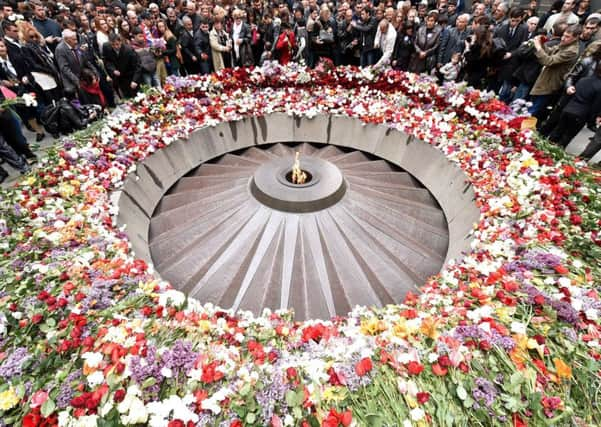100 years on, remembering Armenian genocide


The annual 24 April events mark the day when some 250 Armenian intellectuals were rounded up in what is regarded as the first step of the massacres. An estimated 1.5 million died in the killings, deportations and forced marches that began in 1915, as Ottoman officials feared the Christian Armenians would side with Russia, its enemy in the First World War.
The event is widely viewed by historians as genocide but modern Turkey, the successor to the Ottoman Empire, vehemently rejects the charge, saying that the toll has been inflated and that those killed were victims of civil war and unrest. On the eve of the centennial, Turkish president Recep Tayyip Erdogan insisted his nation’s ancestors never committed genocide.
Advertisement
Hide AdAdvertisement
Hide AdRussian president Vladimir Putin, his French counterpart, Francois Hollande, and other dignitaries assembled yesterday morning at the Tsitsernakaberd memorial complex in the capital, Yerevan.
Each leader walked along the memorial with a single yellow rose and put it into the centre of a wreath resembling a forget-me-not, a flower that was made the symbol of the commemoration.
“We will never forget the tragedy that your people went through,” Mr Hollande said.
France is home to a sizeable Armenian community. Among the French Armenians at Yerevan was singer Charles Aznavour, 90, who was born in Paris to a family of massacre survivors.
For many Armenians, the anniversary is not only a moment of grief but also a reminder of the resilience of the nation. “We feel a big pain today, historic pain, but at the same time we feel a big historic strength,” Nadezhda Antonyan, a teacher from Yerevan said. “We should not only survive but we must live, be strong and build our statehood.”
Mr Putin used his speech to warn of the dangers of nationalism as well as “Russophobia”, in a clear dig at the West-leaning government in Ukraine.
Earlier this month, Turkey recalled its ambassadors to Vienna and the Vatican after Austria and Pope Francis described the killings as genocide. The European Parliament has also triggered Turkey’s ire by passing a non-binding resolution to commemorate “the centenary of the Armenian genocide”.
Armenian president Serge Sarkisian expressed hope that recent steps to recognise the massacre as genocide would help “dispel the darkness of 100 years of denial”.
Advertisement
Hide AdAdvertisement
Hide AdArmenians and Turks planned to march in Istanbul to remember the Armenian intellectuals who were rounded up in the city and to urge the government into recognising genocide. A small nationalist group planned a protest denouncing the accusations of genocide.
Mr Sarkisian welcomed the rally to honour the dead, calling them “strong people who are doing an important thing for their motherland”.
Turkish premier Ahmet Davutoglu earlier this week issued a message of condolence to the descendants of the Armenian victims, without going so far as calling the killings genocide.